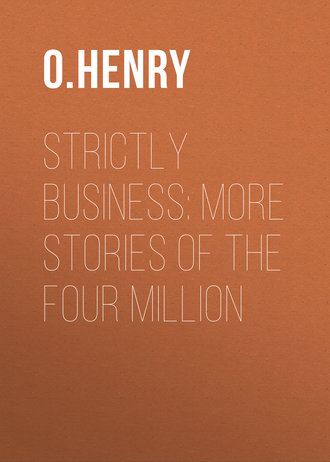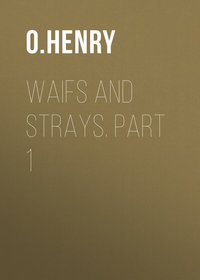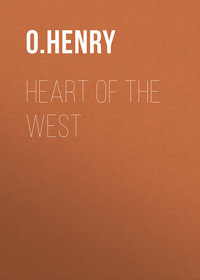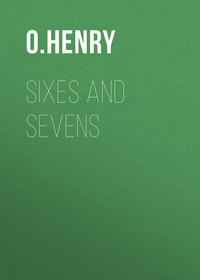 полная версия
полная версияStrictly Business: More Stories of the Four Million
"What is it to you?" I asked, a little sharply.
"Nothin', suh, jus' nothin'. Only it's a lonesome kind of part of town and few folks ever has business out there. Step right in. The seats is clean – jes' got back from a funeral, suh."
A mile and a half it must have been to our journey's end. I could hear nothing but the fearful rattle of the ancient hack over the uneven brick paving; I could smell nothing but the drizzle, now further flavored with coal smoke and something like a mixture of tar and oleander blossoms. All I could see through the streaming windows were two rows of dim houses.
The city has an area of 10 square miles; 181 miles of streets, of which 137 miles are paved; a system of water-works that cost $2,000,000, with 77 miles of mains.
Eight-sixty-one Jessamine Street was a decayed mansion. Thirty yards back from the street it stood, outmerged in a splendid grove of trees and untrimmed shrubbery. A row of box bushes overflowed and almost hid the paling fence from sight; the gate was kept closed by a rope noose that encircled the gate post and the first paling of the gate. But when you got inside you saw that 861 was a shell, a shadow, a ghost of former grandeur and excellence. But in the story, I have not yet got inside.
When the hack had ceased from rattling and the weary quadrupeds came to a rest I handed my jehu his fifty cents with an additional quarter, feeling a glow of conscious generosity, as I did so. He refused it.
"It's two dollars, suh," he said.
"How's that?" I asked. "I plainly heard you call out at the hotel: 'Fifty cents to any part of the town.'"
"It's two dollars, suh," he repeated obstinately. "It's a long ways from the hotel."
"It is within the city limits and well within them." I argued. "Don't think that you have picked up a greenhorn Yankee. Do you see those hills over there?" I went on, pointing toward the east (I could not see them, myself, for the drizzle); "well, I was born and raised on their other side. You old fool nigger, can't you tell people from other people when you see 'em?"
The grim face of King Cettiwayo softened. "Is you from the South, suh? I reckon it was them shoes of yourn fooled me. They is somethin' sharp in the toes for a Southern gen'l'man to wear."
"Then the charge is fifty cents, I suppose?" said I inexorably.
His former expression, a mingling of cupidity and hostility, returned, remained ten seconds, and vanished.
"Boss," he said, "fifty cents is right; but I needs two dollars, suh; I'm obleeged to have two dollars. I ain't demandin' it now, suh; after I know whar you's from; I'm jus' sayin' that I has to have two dollars to-night, and business is mighty po'."
Peace and confidence settled upon his heavy features. He had been luckier than he had hoped. Instead of having picked up a greenhorn, ignorant of rates, he had come upon an inheritance.
"You confounded old rascal," I said, reaching down to my pocket, "you ought to be turned over to the police."
For the first time I saw him smile. He knew; he knew. HE KNEW.
I gave him two one-dollar bills. As I handed them over I noticed that one of them had seen parlous times. Its upper right-hand corner was missing, and it had been torn through the middle, but joined again. A strip of blue tissue paper, pasted over the split, preserved its negotiability.
Enough of the African bandit for the present: I left him happy, lifted the rope and opened a creaky gate.
The house, as I said, was a shell. A paint brush had not touched it in twenty years. I could not see why a strong wind should not have bowled it over like a house of cards until I looked again at the trees that hugged it close – the trees that saw the battle of Nashville and still drew their protecting branches around it against storm and enemy and cold.
Azalea Adair, fifty years old, white-haired, a descendant of the cavaliers, as thin and frail as the house she lived in, robed in the cheapest and cleanest dress I ever saw, with an air as simple as a queen's, received me.
The reception room seemed a mile square, because there was nothing in it except some rows of books, on unpainted white-pine bookshelves, a cracked marble-top table, a rag rug, a hairless horsehair sofa and two or three chairs. Yes, there was a picture on the wall, a colored crayon drawing of a cluster of pansies. I looked around for the portrait of Andrew Jackson and the pinecone hanging basket but they were not there.
Azalea Adair and I had conversation, a little of which will be repeated to you. She was a product of the old South, gently nurtured in the sheltered life. Her learning was not broad, but was deep and of splendid originality in its somewhat narrow scope. She had been educated at home, and her knowledge of the world was derived from inference and by inspiration. Of such is the precious, small group of essayists made. While she talked to me I kept brushing my fingers, trying, unconsciously, to rid them guiltily of the absent dust from the half-calf backs of Lamb, Chaucer, Hazlitt, Marcus Aurelius, Montaigne and Hood. She was exquisite, she was a valuable discovery. Nearly everybody nowadays knows too much – oh, so much too much – of real life.
I could perceive clearly that Azalea Adair was very poor. A house and a dress she had, not much else, I fancied. So, divided between my duty to the magazine and my loyalty to the poets and essayists who fought Thomas in the valley of the Cumberland, I listened to her voice, which was like a harpsichord's, and found that I could not speak of contracts. In the presence of the nine Muses and the three Graces one hesitated to lower the topic to two cents. There would have to be another colloquy after I had regained my commercialism. But I spoke of my mission, and three o'clock of the next afternoon was set for the discussion of the business proposition.
"Your town," I said, as I began to make ready to depart (which is the time for smooth generalities), "seems to be a quiet, sedate place. A home town, I should say, where few things out of the ordinary ever happen."
It carries on an extensive trade in stoves and hollow ware with the West and South, and its flouring mills have a daily capacity of more than 2,000 barrels.
Azalea Adair seemed to reflect.
"I have never thought of it that way," she said, with a kind of sincere intensity that seemed to belong to her. "Isn't it in the still, quiet places that things do happen? I fancy that when God began to create the earth on the first Monday morning one could have leaned out one's window and heard the drops of mud splashing from His trowel as He built up the everlasting hills. What did the noisiest project in the world – I mean the building of the Tower of Babel – result in finally? A page and a half of Esperanto in the North American Review."
"Of course," said I platitudinously, "human nature is the same everywhere; but there is more color – er – more drama and movement and – er – romance in some cities than in others."
"On the surface," said Azalea Adair. "I have traveled many times around the world in a golden airship wafted on two wings – print and dreams. I have seen (on one of my imaginary tours) the Sultan of Turkey bowstring with his own hands one of his wives who had uncovered her face in public. I have seen a man in Nashville tear up his theatre tickets because his wife was going out with her face covered – with rice powder. In San Francisco's Chinatown I saw the slave girl Sing Yee dipped slowly, inch by inch, in boiling almond oil to make her swear she would never see her American lover again. She gave in when the boiling oil had reached three inches above her knee. At a euchre party in East Nashville the other night I saw Kitty Morgan cut dead by seven of her schoolmates and lifelong friends because she had married a house painter. The boiling oil was sizzling as high as her heart; but I wish you could have seen the fine little smile that she carried from table to table. Oh, yes, it is a humdrum town. Just a few miles of red brick houses and mud and lumber yards."
Some one knocked hollowly at the back of the house. Azalea Adair breathed a soft apology and went to investigate the sound. She came back in three minutes with brightened eyes, a faint flush on her cheeks, and ten years lifted from her shoulders.
"You must have a cup of tea before you go," she said, "and a sugar cake."
She reached and shook a little iron bell. In shuffled a small Negro girl about twelve, barefoot, not very tidy, glowering at me with thumb in mouth and bulging eyes.
Azalea Adair opened a tiny, worn purse and drew out a dollar bill, a dollar bill with the upper right-hand corner missing, torn in two pieces, and pasted together again with a strip of blue tissue paper. It was one of the bills I had given the piratical Negro – there was no doubt about it.
"Go up to Mr. Baker's store on the corner, Impy," she said, handing the girl the dollar bill, "and get a quarter of a pound of tea – the kind he always sends me – and ten cents worth of sugar cakes. Now, hurry. The supply of tea in the house happens to be exhausted," she explained to me.
Impy left by the back way. Before the scrape of her hard, bare feet had died away on the back porch, a wild shriek – I was sure it was hers – filled the hollow house. Then the deep, gruff tones of an angry man's voice mingled with the girl's further squeals and unintelligible words.
Azalea Adair rose without surprise or emotion and disappeared. For two minutes I heard the hoarse rumble of the man's voice; then something like an oath and a slight scuffle, and she returned calmly to her chair.
"This is a roomy house," she said, "and I have a tenant for part of it. I am sorry to have to rescind my invitation to tea. It was impossible to get the kind I always use at the store. Perhaps to-morrow, Mr. Baker will be able to supply me."
I was sure that Impy had not had time to leave the house. I inquired concerning street-car lines and took my leave. After I was well on my way I remembered that I had not learned Azalea Adair's name. But to-morrow would do.
That same day I started in on the course of iniquity that this uneventful city forced upon me. I was in the town only two days, but in that time I managed to lie shamelessly by telegraph, and to be an accomplice – after the fact, if that is the correct legal term – to a murder.
As I rounded the corner nearest my hotel the Afrite coachman of the polychromatic, nonpareil coat seized me, swung open the dungeony door of his peripatetic sarcophagus, flirted his feather duster and began his ritual: "Step right in, boss. Carriage is clean – jus' got back from a funeral. Fifty cents to any – "
And then he knew me and grinned broadly. "'Scuse me, boss; you is de gen'l'man what rid out with me dis mawnin'. Thank you kindly, suh."
"I am going out to 861 again to-morrow afternoon at three," said I, "and if you will be here, I'll let you drive me. So you know Miss Adair?" I concluded, thinking of my dollar bill.
"I belonged to her father, Judge Adair, suh," he replied.
"I judge that she is pretty poor," I said. "She hasn't much money to speak of, has she?"
For an instant I looked again at the fierce countenance of King Cettiwayo, and then he changed back to an extortionate old Negro hack driver.
"She ain't gwine to starve, suh," he said slowly. "She has reso'ces, suh; she has reso'ces."
"I shall pay you fifty cents for the trip," said I.
"Dat is puffeckly correct, suh," he answered humbly. "I jus' had to have dat two dollars dis mawnin', boss."
I went to the hotel and lied by electricity. I wired the magazine: "A. Adair holds out for eight cents a word."
The answer that came back was: "Give it to her quick you duffer."
Just before dinner "Major" Wentworth Caswell bore down upon me with the greetings of a long-lost friend. I have seen few men whom I have so instantaneously hated, and of whom it was so difficult to be rid. I was standing at the bar when he invaded me; therefore I could not wave the white ribbon in his face. I would have paid gladly for the drinks, hoping, thereby, to escape another; but he was one of those despicable, roaring, advertising bibbers who must have brass bands and fireworks attend upon every cent that they waste in their follies.
With an air of producing millions he drew two one-dollar bills from a pocket and dashed one of them upon the bar. I looked once more at the dollar bill with the upper right-hand corner missing, torn through the middle, and patched with a strip of blue tissue paper. It was my dollar bill again. It could have been no other.
I went up to my room. The drizzle and the monotony of a dreary, eventless Southern town had made me tired and listless. I remember that just before I went to bed I mentally disposed of the mysterious dollar bill (which might have formed the clew to a tremendously fine detective story of San Francisco) by saying to myself sleepily: "Seems as if a lot of people here own stock in the Hack-Driver's Trust. Pays dividends promptly, too. Wonder if – " Then I fell asleep.
King Cettiwayo was at his post the next day, and rattled my bones over the stones out to 861. He was to wait and rattle me back again when I was ready.
Azalea Adair looked paler and cleaner and frailer than she had looked on the day before. After she had signed the contract at eight cents per word she grew still paler and began to slip out of her chair. Without much trouble I managed to get her up on the antediluvian horsehair sofa and then I ran out to the sidewalk and yelled to the coffee-colored Pirate to bring a doctor. With a wisdom that I had not expected in him, he abandoned his team and struck off up the street afoot, realizing the value of speed. In ten minutes he returned with a grave, gray-haired and capable man of medicine. In a few words (worth much less than eight cents each) I explained to him my presence in the hollow house of mystery. He bowed with stately understanding, and turned to the old Negro.
"Uncle Cæsar," he said calmly, "Run up to my house and ask Miss Lucy to give you a cream pitcher full of fresh milk and half a tumbler of port wine. And hurry back. Don't drive – run. I want you to get back sometime this week."
It occurred to me that Dr. Merriman also felt a distrust as to the speeding powers of the land-pirate's steeds. After Uncle Cæsar was gone, lumberingly, but swiftly, up the street, the doctor looked me over with great politeness and as much careful calculation until he had decided that I might do.
"It is only a case of insufficient nutrition," he said. "In other words, the result of poverty, pride, and starvation. Mrs. Caswell has many devoted friends who would be glad to aid her, but she will accept nothing except from that old Negro, Uncle Cæsar, who was once owned by her family."
"Mrs. Caswell!" said I, in surprise. And then I looked at the contract and saw that she had signed it "Azalea Adair Caswell."
"I thought she was Miss Adair," I said.
"Married to a drunken, worthless loafer, sir," said the doctor. "It is said that he robs her even of the small sums that her old servant contributes toward her support."
When the milk and wine had been brought the doctor soon revived Azalea Adair. She sat up and talked of the beauty of the autumn leaves that were then in season, and their height of color. She referred lightly to her fainting seizure as the outcome of an old palpitation of the heart. Impy fanned her as she lay on the sofa. The doctor was due elsewhere, and I followed him to the door. I told him that it was within my power and intentions to make a reasonable advance of money to Azalea Adair on future contributions to the magazine, and he seemed pleased.
"By the way," he said, "perhaps you would like to know that you have had royalty for a coachman. Old Cæsar's grandfather was a king in Congo. Cæsar himself has royal ways, as you may have observed."
As the doctor was moving off I heard Uncle Cæsar's voice inside: "Did he get bofe of dem two dollars from you, Mis' Zalea?"
"Yes, Cæsar," I heard Azalea Adair answer weakly. And then I went in and concluded business negotiations with our contributor. I assumed the responsibility of advancing fifty dollars, putting it as a necessary formality in binding our bargain. And then Uncle Cæsar drove me back to the hotel.
Here ends all of the story as far as I can testify as a witness. The rest must be only bare statements of facts.
At about six o'clock I went out for a stroll. Uncle Cæsar was at his corner. He threw open the door of his carriage, flourished his duster and began his depressing formula: "Step right in, suh. Fifty cents to anywhere in the city – hack's puffickly clean, suh – jus' got back from a funeral – "
And then he recognized me. I think his eyesight was getting bad. His coat had taken on a few more faded shades of color, the twine strings were more frayed and ragged, the last remaining button – the button of yellow horn – was gone. A motley descendant of kings was Uncle Cæsar!
About two hours later I saw an excited crowd besieging the front of a drug store. In a desert where nothing happens this was manna; so I wedged my way inside. On an extemporized couch of empty boxes and chairs was stretched the mortal corporeality of Major Wentworth Caswell. A doctor was testing him for the immortal ingredient. His decision was that it was conspicuous by its absence.
The erstwhile Major had been found dead on a dark street and brought by curious and ennuied citizens to the drug store. The late human being had been engaged in terrific battle – the details showed that. Loafer and reprobate though he had been, he had been also a warrior. But he had lost. His hands were yet clinched so tightly that his fingers would not be opened. The gentle citizens who had know him stood about and searched their vocabularies to find some good words, if it were possible, to speak of him. One kind-looking man said, after much thought: "When 'Cas' was about fo'teen he was one of the best spellers in school."
While I stood there the fingers of the right hand of "the man that was" which hung down the side of a white pine box, relaxed, and dropped something at my feet. I covered it with one foot quietly, and a little later on I picked it up and pocketed it. I reasoned that in his last struggle his hand must have seized that object unwittingly and held it in a death grip.
At the hotel that night the main topic of conversation, with the possible exceptions of politics and prohibition, was the demise of Major Caswell. I heard one man say to a group of listeners:
"In my opinion, gentlemen, Caswell was murdered by some of these no-account niggers for his money. He had fifty dollars this afternoon which he showed to several gentlemen in the hotel. When he was found the money was not on his person."
I left the city the next morning at nine, and as the train was crossing the bridge over the Cumberland River I took out of my pocket a yellow horn overcoat button the size of a fifty-cent piece, with frayed ends of coarse twine hanging from it, and cast it out of the window into the slow, muddy waters below.
I wonder what's doing in Buffalo!
XIV
PSYCHE AND THE PSKYSCRAPER
If you are a philosopher you can do this thing: you can go to the top of a high building, look down upon your fellow-men 300 feet below, and despise them as insects. Like the irresponsible black waterbugs on summer ponds, they crawl and circle and hustle about idiotically without aim or purpose. They do not even move with the admirable intelligence of ants, for ants always know when they are going home. The ant is of a lowly station, but he will often reach home and get his slippers on while you are left at your elevated station.
Man, then, to the housetopped philosopher, appears to be but a creeping, contemptible beetle. Brokers, poets, millionaires, bootblacks, beauties, hod-carriers and politicians become little black specks dodging bigger black specks in streets no wider than your thumb.
From this high view the city itself becomes degraded to an unintelligible mass of distorted buildings and impossible perspectives; the revered ocean is a duck pond; the earth itself a lost golf ball. All the minutiae of life are gone. The philosopher gazes into the infinite heavens above him, and allows his soul to expand to the influence of his new view. He feels that he is the heir to Eternity and the child of Time. Space, too, should be his by the right of his immortal heritage, and he thrills at the thought that some day his kind shall traverse those mysterious aerial roads between planet and planet. The tiny world beneath his feet upon which this towering structure of steel rests as a speck of dust upon a Himalayan mountain – it is but one of a countless number of such whirling atoms. What are the ambitions, the achievements, the paltry conquests and loves of those restless black insects below compared with the serene and awful immensity of the universe that lies above and around their insignificant city?
It is guaranteed that the philosopher will have these thoughts. They have been expressly compiled from the philosophies of the world and set down with the proper interrogation point at the end of them to represent the invariable musings of deep thinkers on high places. And when the philosopher takes the elevator down his mind is broader, his heart is at peace, and his conception of the cosmogony of creation is as wide as the buckle of Orion's summer belt.
But if your name happened to be Daisy, and you worked in an Eighth Avenue candy store and lived in a little cold hall bedroom, five feet by eight, and earned $6 per week, and ate ten-cent lunches and were nineteen years old, and got up at 6.30 and worked till 9, and never had studied philosophy, maybe things wouldn't look that way to you from the top of a skyscraper.
Two sighed for the hand of Daisy, the unphilosophical. One was Joe, who kept the smallest store in New York. It was about the size of a tool-box of the D. P. W., and was stuck like a swallow's nest against a corner of a down-town skyscraper. Its stock consisted of fruit, candies, newspapers, song books, cigarettes, and lemonade in season. When stern winter shook his congealed locks and Joe had to move himself and the fruit inside, there was exactly room in the store for the proprietor, his wares, a stove the size of a vinegar cruet, and one customer.
Joe was not of the nation that keeps us forever in a furore with fugues and fruit. He was a capable American youth who was laying by money, and wanted Daisy to help him spend it. Three times he had asked her.
"I got money saved up, Daisy," was his love song; "and you know how bad I want you. That store of mine ain't very big, but – "
"Oh, ain't it?" would be the antiphony of the unphilosophical one. "Why, I heard Wanamaker's was trying to get you to sublet part of your floor space to them for next year."
Daisy passed Joe's corner every morning and evening.
"Hello, Two-by-Four!" was her usual greeting. "Seems to me your store looks emptier. You must have sold a pack of chewing gum."
"Ain't much room in here, sure," Joe would answer, with his slow grin, "except for you, Daise. Me and the store are waitin' for you whenever you'll take us. Don't you think you might before long?"
"Store!" – a fine scorn was expressed by Daisy's uptilted nose – "sardine box! Waitin' for me, you say? Gee! you'd have to throw out about a hundred pounds of candy before I could get inside of it, Joe."
"I wouldn't mind an even swap like that," said Joe, complimentary.
Daisy's existence was limited in every way. She had to walk sideways between the counter and the shelves in the candy store. In her own hall bedroom coziness had been carried close to cohesiveness. The walls were so near to one another that the paper on them made a perfect Babel of noise. She could light the gas with one hand and close the door with the other without taking her eyes off the reflection of her brown pompadour in the mirror. She had Joe's picture in a gilt frame on the dresser, and sometimes – but her next thought would always be of Joe's funny little store tacked like a soap box to the corner of that great building, and away would go her sentiment in a breeze of laughter.
Daisy's other suitor followed Joe by several months. He came to board in the house where she lived. His name was Dabster, and he was a philosopher. Though young, attainments stood out upon him like continental labels on a Passaic (N. J.) suit-case. Knowledge he had kidnapped from cyclopedias and handbooks of useful information; but as for wisdom, when she passed he was left sniffling in the road without so much as the number of her motor car. He could and would tell you the proportion of water and muscle-making properties of peas and veal, the shortest verse in the Bible, the number of pounds of shingle nails required to fasten 256 shingles laid four inches to the weather, the population of Kankakee, Ill., the theories of Spinoza, the name of Mr. H. McKay Twombly's second hall footman, the length of the Hoosac Tunnel, the best time to set a hen, the salary of the railway post-office messenger between Driftwood and Red Bank Furnace, Pa., and the number of bones in the foreleg of a cat.









![Heart of the West [Annotated]](/covers_200/25561004.jpg)